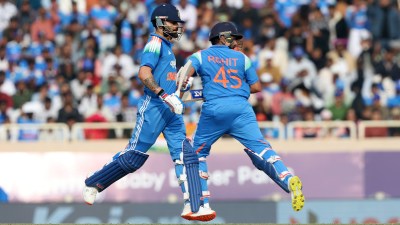When change means past unchanged
On the way from Patna to Muzaffarpur, village after village offers an unchanging story. It can be summed up in two words: disempowered voter...

On the way from Patna to Muzaffarpur, village after village offers an unchanging story. It can be summed up in two words: disempowered voter.
It is not always that the voter is not allowed to cast his vote on D-day, though that is indeed true of many of the small villages you might cross here—for instance Pojhian. The most abject face of disempowerment is that of the voter who may vote, and if he belongs to a backward caste, he has probably been allowed to do so since Laloo Prasad Yadav came to power, but has no faith in its efficacy to change his daily life.
At Pojhian, the power lines come alive for about three months in a year. At Lakhansarai they point to the poles that stand, tall and dead. In the run-up to elections this time, four more have come up. If someone should be naive enough to send in an application to the electricity board, a hefty bill is despatched—and no electricity, of course.
In Ghataro, the school is a deserted building that was built by the ward councillor Urmila Devi. Pojhian has two schools—the one for the ‘‘backwards’’ has a single teacher for Classes I to V; the school for the ‘‘forwards’’ has three teachers for the same number of classes. But teaching only happens in the village’s two private tuition shops. There is no electricity, no school in Chakbhatti.
In all these villages, ‘‘backward-forward’’ is a category of daily currency. When no government works for you, you might as well vote your own caste, says Anandi Thakur of Lakhansarai.
This mood of philosophical resignation seems to abruptly fall away once you hit Lalganj town. This is the heart of Munna Shukla territory. Shukla is the sitting MLA here, elected as an Independent in the 2000 Assembly elections, recently joined the Lok Janshakti Party (LJP). Shukla is said to be one of the most notorious of the stable of upper-caste dons that Ram Vilas Paswan has drafted to his side to take on the RJD’s bahubalis and dabangs. Munnaji gives money if your daughter gets married. Munnaji helps out with money for death ceremonies too. See that road, he got it built. He is developing Lalganj into the second Patna. In Bihar, where the state has slowly shrunk and withered away, Munna Shukla is someone who can get things done.
In Muzaffarpur, in the drawing room of Professor Uday Shankar, much respected by those who remember he took the police lathi that swung at JP on his own shoulder on November 4, 1974, the air is musty with the smell of jilted possibilities. Uday Babu’s friends have gathered again this evening to share their alienation from the march of social justice in a state where they once dreamed together of a more encompassing revolution. It’s tragic, they agree, Munna Shukla does get things done—he fixed the rates buses can charge to take villagers to Patna, and the rates doctors can charge patients.
‘‘What a mandate he had,’’ says Uday. ‘‘Lalooji could have done so much with it if he wanted to…He could have made history. Yet, look at him, when he was looking for a CM in his place, he didn’t even trust his castemen, he gave it to his wife.’’
So what’s the way out? It’s only if good people come back to politics, Uday is certain. All those who turned from the way things are must come back into politics to reclaim it from the political entrepreneurs and musclemen.
Photos




- 01
- 02
- 03
- 04
- 05



























